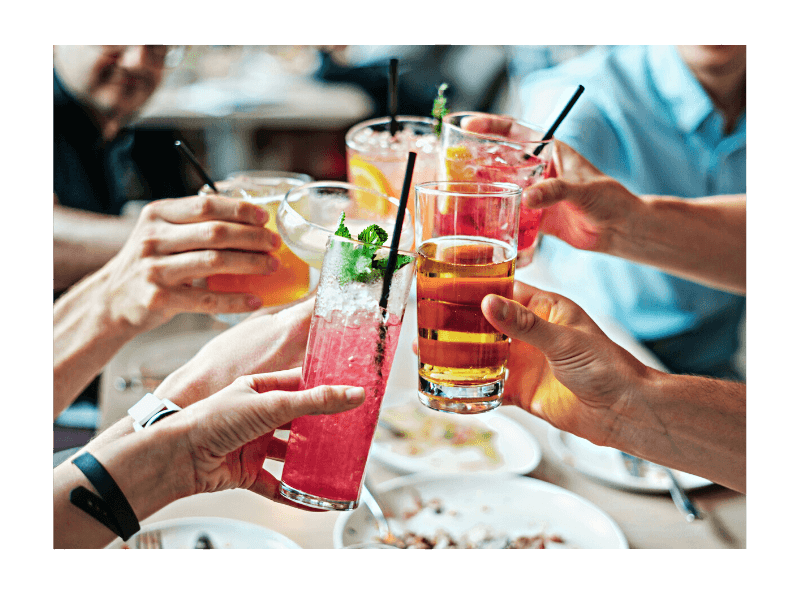If you have inflammatory bowel disease (IBD) knowing what foods and drinks affect you and your symptoms can feel like a guessing game. Foods are often the most common focus, but if you have IBD you may wonder if avoiding alcohol would help manage your condition better. Like many things with IBD, the answer can vary from person to person. However, some research does suggest that to try to prevent flare-ups you may want to consider avoiding alcohol.
Here we take a look at how alcohol can affect IBD, if there is a risk of mixing alcohol and IBD medications, and if there is a connection between alcohol and flare-ups. While this post is designed to provide you with information about IBD and alcohol, we always recommend talking with your GI specialist before making changes to your treatment plan.
How Does Alcohol Affect People With IBD?
If you have been diagnosed with IBD, you need to know how alcohol affects your health. Drinking alcohol tends to suppress your immune system and this can affect your general health. According to recent research, consumption of alcohol poses a higher risk of relapse.
You may also be at a higher risk of severe gastrointestinal inflammation. Alcohol was identified as a potential trigger of worsening GI symptoms in an online survey. However, no particular type of alcoholic beverage was associated.
Studies also suggest that alcohol can cause inflammation of the gastrointestinal lining. This may also limit the absorption of nutrients too. Staying hydrated is often a struggle for IBD patients, especially those in a flare. Alcohol can complicate this further. Instead of helping your body remain hydrated, alcohol tends to dehydrate your body. As a result of losing water, your body may not be in a position to control the effects of IBD.
Ideally, alcohol consumption decreases the function of certain body cells and this can interfere with your body’s immune system and ultimately affect the gut functions. The body may not be able to fight disease-causing organisms.
Is There A Risk With IBD Medication And Mixing Alcohol?
Alcohol consumption can interfere with the absorption of medications used to treat the inflammation caused by the disease. Some studies show that alcohol intake 1-3x/week increases the risk of relapse and/or flare by 271%.
As a result, people with IBD should avoid alcohol as it can inhibit the metabolism of the medication meant to treat this condition. This may prolong the recovery process and can also make the symptoms get worse.
Although some alcoholic beverages are often referred to as health-promoting like red wine, drinking it in large quantities makes it difficult to monitor the disease. Study shows that sulfites in processed foods and wine increases the risk of relapse and/or flare by 276%.
Therefore, alcohol consumption in IBD patients has more negative effects that can make the management and monitoring of the diseases more difficult.
What Is the Connection between Alcohol and Flare-Ups
You may also need to know about the connection with flare-ups and adjust your lifestyle accordingly. Alcohol consumption in patients with IBD tends to increase the risk of flare. Alcohol has pre-oxidants that can affect the gut’s function.
If you consume alcohol, you may have a buildup of toxins that can damage your gut. This can cause inflammation that will consequently make the symptoms worse. The toxins may cause flare-ups which trigger bleeding. Additionally, alcohol can change how excretions are released from your body, and this may cause extensive damage to your gastrointestinal lining.
There are some risk factors associated with alcohol consumption in patients with IBD including
- Age – most IBD patients are diagnosed with the disease before the age of 30.
- Family history – if your family has a history of IBD, you may also be at a higher risk
- Smoking cigarettes – smoking tends to affect the general health and can slow down the healing process
- Use of nonsteroidal anti-inflammatory medications – these medications can cause inflammation and make it difficult to manage or control IBD.
The Takeaway
If you suffer from IBD, it is essential that you adjust your lifestyle, eating, and drinking habits. Cutting your alcohol consumption may be a step toward your healing journey. Maintaining a healthy lifestyle free of alcohol consumption can also reduce the risk of flare-ups. While some people can tolerate smaller amounts of alcohol with IBD, it’s best to use caution with it since it can increase the risk of flare and complicate hydration. This may affect the gastrointestinal lining, which is already compromised, and increase the risk of more severe symptoms.
Let Crohn’s and Colitis Dietitians Help You Manage IBD
Need help on how to manage inflammatory bowel disease and reduce the risk of relapse? Talk to professional dietitians and learn how changing your lifestyle can make you live a healthy life once more. At Crohn’s and Colitis Dietitians, our professional dietitians can help you adjust your diet and live a healthy life altogether. For more information on adjusting your diet, contact us today to get started.




0 Comments